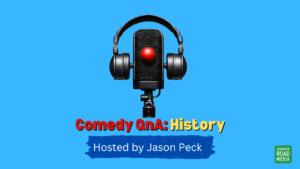I decided to write a follow-up to my last post Secret Comedy Writing Technique – Funny Words. As I said before you don’t have to use this technique at all in order to be funny, but it’s certainly worth being aware of.
This post focuses on funny names and is an area that frequently pops up alongside the funny words topic, but I decided to separate them out. From what I’ve been able to understand, funny names have always cropped up in comedy.
They were prevalent during the Restoration period in England during the 1660s. Although they probably pop up in the comedies of the Greek comic playwright Aristophanes, who used names like “Dikaiopolis” (meaning “just city”). But I am unsure if this would also be a wordplay derivative of the phallic slang term of d*ck or not. But I guess it was phallus and so the “Dikaiopolis” double entendre only works in English.
Many of the comedies to hit the London stages during the time of the Restoration were quite satirical and scathing of the social mores of the day and often the names of the characters would reflect key aspects of their personality or some other foible. For example in “The Country Wife” the lead character was called Horner in reference to the fact that he was quite a Lothario (Horner being derivative if horny) with the town’s married women.
In more recent times American comedian Jonathan Winters had characters such as Granny Frickert, Hortense Powdermarker and Daphne Kugelmass. Though not necessarily representative of the characters’ personality traits like the characters of the Restoration comedies, they were comedy names nonetheless designed to help elicit laughter.
Woody Allen frequently used funny names both in his stand-up (he spoke about his friend Eggs Benedict) and in his written humour (Mendel, Moses Goldworm and Kugelmass) in text such as Woody Allen: The Complete Prose and Mere Anarchy.
For the most part the majority of comedians and humorists don’t really use comedy names as much any more because it comes across as being too fake.
Many comedians try to use truth in their acts, even if it’s not the searing truth of comedians like Bill Hicks or George Carlin there is an element of truth amongst the exaggeration and surrealism. But the use of comedy names makes us feel as though we’re being joked.
One comedian that comes to mind who does seem to have “gotten away” with using a comedy name in his act is the English comedian Eddie Izzard. He often refers to his old clarinet teacher, Mrs. Badcrumble in both his shows “Definite Article” and “Glorious”. I’m not sure why it’s funny, and to be honest I don’t really care. The fact is, it is funny. It’s very funny indeed.
But without going into the realms of fantasy with names previously mentioned there are certain real names which have a certain funniness to them. Names that fit into this include Cleatus, Bubba, Victor and Reginald. This harks back to the funny words that I wrote about previously.
The use of funny names can also extend to towns and cities such as Oshkosh (as in the children’s clothing manufactuer Oshkosh B’gosh), Cleveland and Flushdyke in the Northern English town of Ossett. This comedy technique, using funny place names, was a technique popular with American comedians in the 1940s, 1950s and 60s working the Borscht Belt.
There are also a lot of blatant (but unintentional) rude place names in Britain (like Slack Bottom, West Yorkshire) and around the world . I’m not going to talk about some of the others, but you can find plenty of place names like this in books like Rude UK.
There can also be words or expressions that are funny only when you say them in your own accent. So that is something to bear in mind if you’re thinking about becoming a stand-up comedian. This might not work if you write material for others because they wouldn’t have the facility with certain words that you have when you say them.
I think a potential solution to the use of funny names might be making sure it’s authentic to you. Don’t use a funny name for the sake of using one just because you’re trying to add humour. It will come across as fake and forced.
I personally feel that that was the problem with the English sitcom “Keeping up Appearances”. The lead character Hyacinth Bucket pronunced her surname Bouquet. I understand the character was trying to up her social status, but it just came across as a bit crow-barred for the sake of a gag.
But if you are looking to lace humour into one of your speeches, and it’s appropriate, consider using a funny name of a person or a place. It might produce a smile or even a chuckle, even if it doesn’t produce a rip-roaring laugh.




1 pings
[…] the next part in my on-going mini series Secret Comedy Writing Techniques, in this post I’m covering Oxymorons. And no, they are not a stupid type of cattle. […]